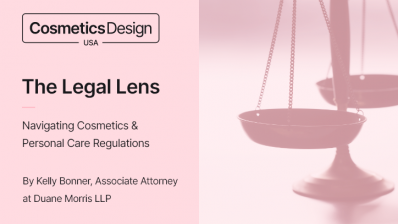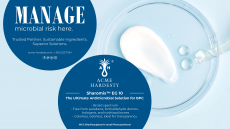Preparing for MoCRA's 2025 cGMP deadline: What cosmetic manufacturers and suppliers need to know

Speaking with CosmeticsDesign, David Rosen, a public policy attorney at Foley & Lardner LLP, said that additional challenges will arise from safety substantiation, supply chain adjustments, and post-market surveillance requirements.
On December 29, 2025, the U.S. Food and Drug Administration (FDA) is required to issue a final rule establishing current Good Manufacturing Practices (cGMPs) for cosmetic product manufacturing facilities (although some industry stakeholders are already predicting a delay). Even though the deadline may seem far away, manufacturers and suppliers should start evaluating their current manufacturing practices and supply chains to avoid scrambling at the last minute, said Rosen, who brings over 14 years of regulatory experience at the FDA.
cGMP compliance: A pressing concern for manufacturers and suppliers
The impending FDA rule on cGMPs is set to standardize manufacturing practices across the cosmetics industry, which means that brands must start engaging their manufacturers to ensure they are ready for compliance by the end of 2025. According to Rosen, some of the most burdensome provisions of MoCRA include cosmetic product facility registration, product listing, and adhering to written Standard Operating Procedures (SOPs) that align with good manufacturing practices. He noted, "Cosmetic product facility registration and cosmetic product listing are some of the most burdensome provisions."
For manufacturers, ensuring that their production facilities meet cGMP standards will be essential to avoid regulatory penalties or disruptions in their operations. Suppliers, in turn, must be prepared to provide clear documentation regarding ingredient safety and compliance.
"Having written SOPs for manufacturing to comply with applicable good manufacturing practices is one of the most significant challenges companies face," Rosen added. With the FDA expected to ramp up enforcement, those who are unprepared could face significant delays or costs.
Supply chain adjustments on the horizon
MoCRA’s emphasis on ingredient safety and transparency will likely create ripple effects throughout the supply chain, and Rosen anticipates a notable shift in how businesses source raw materials. "There may be fewer suppliers because companies have to substantiate the safety of ingredients in formulations," Rosen warned.
With safety substantiation required for each ingredient, many suppliers may struggle to meet these new demands, forcing manufacturers to re-evaluate their supply chains and potentially consolidate the number of products they offer.
This potential reduction in the number of suppliers highlights the urgency for brands to connect with their current partners and confirm that they are taking the necessary steps to comply with the upcoming cGMP standards. Failure to do so could lead to disruptions or forced changes in sourcing at a critical juncture in the regulatory timeline.
Strategic planning for compliance
While the December 2025 deadline is still over a year away, Rosen advised that manufacturers begin the compliance process immediately, as waiting until the final months could prove costly. For companies with large product lines, the workload associated with product listing and safety substantiation will be substantial.
"The product listing and safety substantiation require a significant amount of work if the company has a large product line and many different ingredients," Rosen explained. He recommended conducting a GAP analysis now to identify areas where compliance efforts may fall short and engaging experts to streamline the process.
Rosen also emphasized the importance of focusing on a brand's core product lines. "I recommend that companies review their product line and focus on the products that are the largest sellers," he said. This strategy allows companies to prioritize compliance efforts for their top performers, ensuring they meet regulatory requirements without overextending resources.
Preparing for post-market surveillance and adverse event reporting
In addition to cGMP requirements, MoCRA introduces stringent post-market surveillance measures, requiring manufacturers to log and investigate complaints and report serious adverse events to the FDA. This will involve updating internal complaint handling systems and, for some companies, hiring healthcare professionals to oversee adverse event reporting.
"Companies will have to update and strengthen their product complaint logging and investigation procedures," Rosen explained, noting that this is an area where many cosmetic companies may face challenges due to limited familiarity with FDA requirements.
Rosen also pointed out that training staff and updating SOPs to accommodate these changes could add significant costs to the compliance process. For manufacturers and suppliers, understanding and integrating these new obligations well in advance of the 2025 deadline will be essential to maintaining seamless operations and avoiding costly enforcement actions.
International trade and ingredient safety
For brands that export their products, MoCRA compliance will have implications beyond the U.S. market. Rosen expects that while FDA requirements for cosmetic products are likely to align with many international standards, certain ingredients may still pose challenges.
"There are ingredients that may not be permitted in other jurisdictions," he noted, advising that companies review both domestic and foreign regulations to avoid potential roadblocks to international trade.
Looking forward: FDA guidance and industry adaptation
Although the FDA has yet to finalize the specific requirements for cGMPs under MoCRA, Rosen shared his belief that early action is the best strategy for manufacturers and suppliers. "FDA needs to clarify what types and amounts of safety substantiation are required," he said, adding that more detailed guidance from the agency will be critical in the coming months.
Companies should remain vigilant for updates from the FDA, while simultaneously working to prepare their operations for the December 2025 deadline.
As Rosen pointed out, the key to successfully navigating MoCRA will be strategic planning and early engagement with suppliers and manufacturing partners. By focusing on core products, simplifying ingredient lists, and ensuring cGMP readiness, companies can position themselves for success under the new regulatory framework.
"It will likely take time to do so," Rosen concluded, urging manufacturers and suppliers to begin their preparations now, well before the final rule takes effect.
For cosmetic brands and their suppliers, the December 2025 cGMP deadline is fast approaching. Ensuring compliance with MoCRA's stringent requirements is not just a regulatory obligation, but a critical step toward maintaining product quality, safety, and market competitiveness in the evolving personal care landscape.















